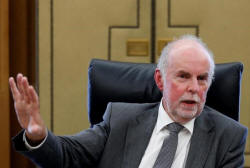Euro zone inflation could take longer to rise: Smets
 Send a link to a friend
Send a link to a friend
 [March 12, 2018] FRANKFURT
(Reuters) - Euro zone inflation may need more time to rise than
anticipated as spare capacity is taking longer to exhaust but the
European Central Bank should not accept price growth below its target,
Belgian policymaker Jan Smets said. [March 12, 2018] FRANKFURT
(Reuters) - Euro zone inflation may need more time to rise than
anticipated as spare capacity is taking longer to exhaust but the
European Central Bank should not accept price growth below its target,
Belgian policymaker Jan Smets said.
With inflation pressures muted, the ECB has not even started a
discussion about revising its monetary policy framework or even its
so-called forward guidance, as the current setup serves the currency
bloc well, Smets told Reuters in an interview.
In a nod to years of rapid growth, the ECB dropped a long-standing
pledge last week to increase bond buying if needed, a small step on the
road in ending a 2.55 trillion euro stimulus scheme.
But inflation is proving to be notoriously difficult to boost and will
likely undershoot the ECB's target of almost 2 percent for years to come
so policymakers gave few if any hints that they are willing to end bond
buys this year as markets now expect.
"It will take somewhat more time to get to the objective than we thought
earlier," Smets said. "The level of potential output may have become
higher due to structural reforms and... slack may be bigger."

"It may take more than we thought and inflation pressures could take
more time to build," Smets added. "(But) it is absolutely crucial that
we meet our price stability objective and not accept a level below that;
the objective is what it is and we are not there yet."
Investors are now looking for clues about the ECB's next move in
dismantling stimulus and the cautious comments from Smets suggest the
bank could continue moving only by increments.
Measuring growth capacity and slack in a large and heterogeneous
currency bloc is notoriously difficult but with growth consistently
surprising on the upside and inflation on the downside, current
estimates may be off, Smets argued.
FX FOCUS
Smets added that even if currency market volatility did not feature as
prominently in ECB President Mario Draghi's news conference last week,
the issue remains high on the agenda.
"We absolutely continue to look at the exchange rate and it would be
wrong to assume that we pay less attention than a few weeks ago," Smets
said.
"We expect exchange rate movements to correspond to fundamentals," he
said, referring to the euro's rise in recent months, influenced in part
by U.S. policymakers stated desire for a weaker dollar.
[to top of second column] |

Belgian central bank governor Jan Smets answers a reporter's
question during an interview with Reuters in Brussels, Belgium, May
11, 2016. REUTERS/Francois Lenoir

Having kick started growth and averted the threat of deflation, policymakers
will have to debate whether conclude bond buys in after September but Smets said
this discussion has not yet started.
Even a debate about revising the bank's forward guidance, flagged in earlier
meetings, has not yet started as debate this month focused of removing the
pledge to raise bond buys, if necessary, the ECB's so-called easing bias.
Still, the ECB should eventually revisit its policy framework and may have to
tell markets how interest rates would rise as the guidance now only stipulates
that rates would stay unchanged until "well past" its bond buys.
When asked if "well past" in the guidance has to be better defined, Smets said:
"Eventually yes but we didn't have that discussion yet.
"It's one of several questions we will have to deal with," he argued. "We will
have to discuss all components of the current monetary policy framework,
reinvestments, interest rate guidance or the interest rate itself."
Smets added that the bond buys should not end abruptly and may be wound down
more gradually.
"I think itís only common sense that we should not trigger volatility with
abrupt moves, so some gradualism is probably warranted," he added.
While some recent growth indicators surprised on the downside, it is far from
clear that growth has leveled off, Smets argued.

"It would be too early to conclude that growth is plateauing," he said. "Some
soft indicators have been a bit weaker but the recovery is on solid footing and
we are in a clear, expansionary period."
(Reporting by Balazs Koranyi; Editing by Matthew Mpoke Bigg)
[© 2018 Thomson Reuters. All rights
reserved.] Copyright 2018 Reuters. All rights reserved. This material may not be published,
broadcast, rewritten or redistributed.
Thompson Reuters is solely responsible for this content. |